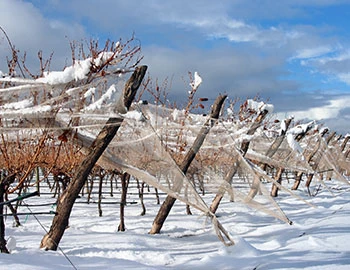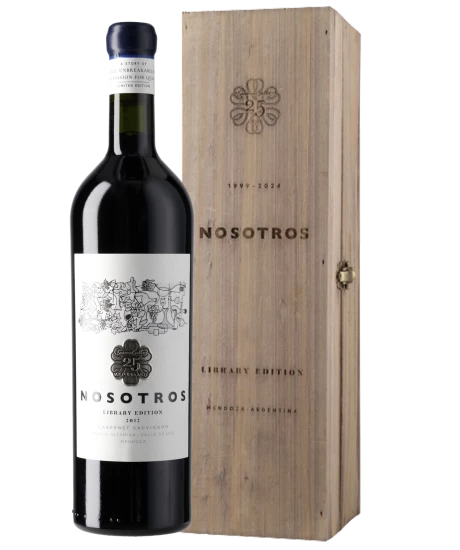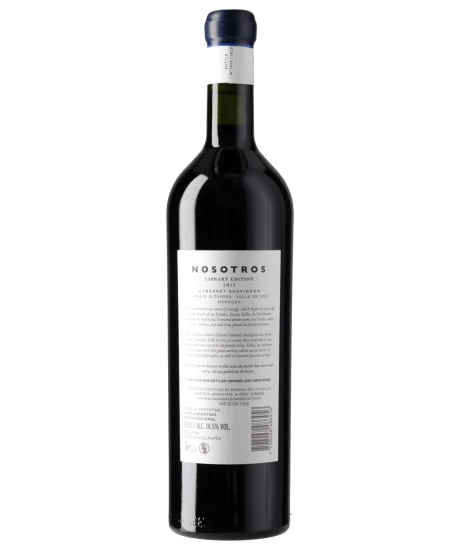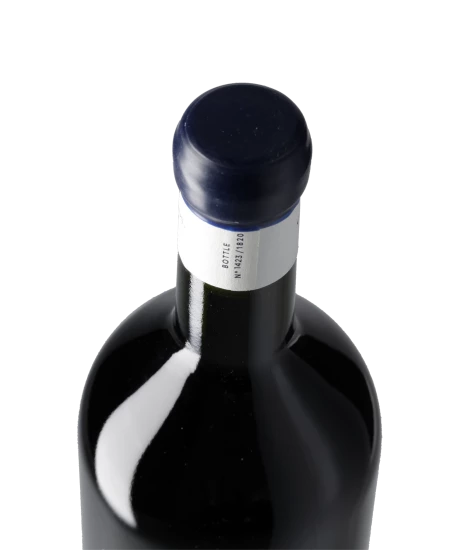Nosotros Library Edition - 25 Anniversary 2012
Nosotros Library Edition - 25 Anniversary 2012
Mendoza, Susana Balbo Wines, 750 ml

Description
25 years full of courage, passion and family ties – with the Nosotros Library Edition Cabernet Sauvignon 2012, Susana Balbo Wines is not only celebrating its 25th anniversary, but also the significant entry of her children José and Ana into the family business in 2012. This single-varietal Cabernet Sauvignon, Susana's favourite variety, impresses with aromas of redcurrant, tobacco and chocolate, complemented by a spicy oak note. With its balanced acidity and fine-grained tannins, it offers an elegant mouthfeel and a long finish. This Argentinian gem is the perfect accompaniment to beef fillet, lamb dishes and a vegetarian bean stew.
Attributes
| Grape variety: | Cabernet Sauvignon |
| Producer: | Susana Balbo Wines |
| Origin: | Argentina / Mendoza |
| Ripening potential: | 5 to 18 years |
| Drinking temperature: | 16 to 18 °C |
| Food Pairing: | Beef Stroganoff, Bistecca fiorentina, T-Bone steak, Châteaubriand, Filet Wellington, Saddle of lamb fillet with herb jus |
| Vinification: | fully destemmed, cooling period, fermentation in steel tank, Pumping over, biological acid degradation in barrel |
| Harvest: | hand-picking |
| Maturation: | in used barriques |
| Bottling: | filtration |
| Maturation duration: | 18 months |
| Volume: | 14.5 % |
| Note: | Contains sulphites |
Susana Balbo Wines
The mighty Aconcagua watches over the plain of Mendoza, 1000 kilometres from Argentina’s capital Buenos Aires. A barren, semi-arid land where Jesuits and Franciscans, after the Spanish conquest in the 16th century, discovered favourable natural conditions for viticulture.
At 1000 to 3000 meters above sea level lies this oldest and most important wine region of the country. The village of Agrelo, near Luján de Cuyo, is home to the bodega founded by Susana Balbo in 1999. She is a woman with an impressive career. In 1981, she became the first woman in Argentina to successfully complete her degree in œnology. In 2015, Drinks Business magazine named her “Woman of the Year”. In 2018, she was recognised as one of the ten most influential women in the international wine trade. She also presided over the national marketing organisation Wines of Argentina for several years.
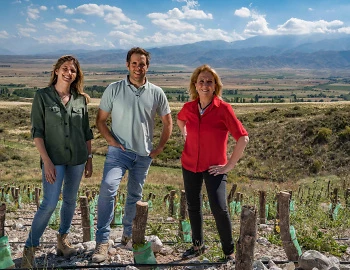
Cabernet Sauvignon
The backbone of Bordeaux
The Cabernet Sauvignon gives the Bordeaux its backbone, yielding deep violet wines with powerful tannins and endless ripening potential. It is the top dog in Médoc, and is placed in all five premier crus of Bordelais. When young, it often appears strict and unapproachable, but with advancing years, its tannins round off. It is wonderfully velvety, and yet always maintains its freshness. Typical flavours include cassis, graphite and cedar. Wherever Cabernet Sauvignon is found, Merlot is not far away. It complements the robust structure of Cabernet with softness, fruit and richness. The Cabernet Sauvignon is the most-exported vine in the world. It delivers persuasive qualities in Italy as an ingredient of the Super Tuscan, or as the flagship variety from California. There, it is lovingly titled “Cab Sauv”. Meat fans should be aware that it fantastically accompanies a grilled entrecôte. The family tree of Cabernet Sauvignon is surprising: its parents are Cabernet Franc and the white Sauvignon blanc.
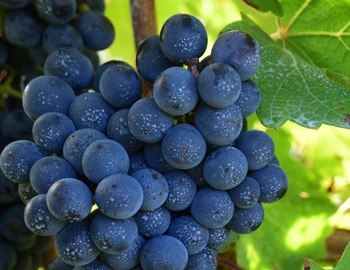
Mendoza
Mendoza: Malbec and more
Whenever someone talks about Argentinian wine, they generally mean wines from Mendoza. Roughly 60 percent of all Argentine wines are produced around the metropolis of the same name. In particular, Malbec, a red wine variety originating from southwestern France, has found a new home here, providing focused, well-structured wines. Cabernet Sauvignon and Chardonnay also thrive. The best wines result from high elevations, in the foothills of the Andes
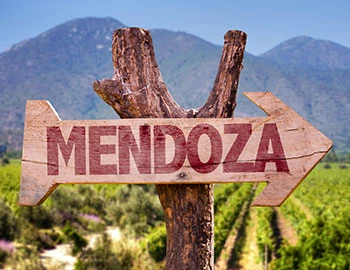
Argentina
Where nostalgia tangoes with innovation
Snow-covered Andean peaks and salt lakes, deserts, rugged mountain villages, elegant colonial cities, vibrant metropolises, red canyons and green valleys – Argentinian has them all. And, of course, excellent wine. Argentina is named after the Latin word for silver, “Argentum,” because of the treasures expected to be found there. Among others, homesick colonialists and Catholic priests had a hand in cultivating these liquid treasures, and today there are approximately 220,000 hectares of vineyards.
